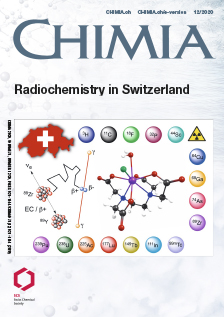Targeted Radiotherapeutics from 'Bench-to-Bedside'
DOI:
https://doi.org/10.2533/chimia.2020.939PMID:
33357286Keywords:
Folate, Psma, Minigastrin, Radiopharmacy, Targeted radionuclide therapy, Terbium radionuclides, TheragnosticsAbstract
The concept of targeted radionuclide therapy (TRT) is the accurate and efficient delivery of radiation to disseminated cancer lesions while minimizing damage to healthy tissue and organs. Critical aspects for successful development of novel radiopharmaceuticals for TRT are: i) the identification and characterization of suitable targets expressed on cancer cells; ii) the selection of chemical or biological molecules which exhibit high affinity and selectivity for the cancer cell-associated target; iii) the selection of a radionuclide with decay properties that suit the properties of the targeting molecule and the clinical purpose. The Center for Radiopharmaceutical Sciences (CRS) at the Paul Scherrer Institute in Switzerland is privileged to be situated close to unique infrastructure for radionuclide production (high energy accelerators and a neutron source) and access to C/B-type laboratories including preclinical, nuclear imaging equipment and Swissmedic-certified laboratories for the preparation of drug samples for human use. These favorable circumstances allow production of non-standard radionuclides, exploring their biochemical and pharmacological features and effects for tumor therapy and diagnosis, while investigating and characterizing new targeting structures and optimizing these aspects for translational research on radiopharmaceuticals. In close collaboration with various clinical partners in Switzerland, the most promising candidates are translated to clinics for 'first-in-human' studies. This article gives an overview of the research activities at CRS in the field of TRT by the presentation of a few selected projects.Downloads
Published
2020-12-23
Issue
Section
Scientific Articles
License
Copyright (c) 2020 Cristina Müller, Martin Béhé, Susanne Geistlich, Nicholas P. van der Meulen, Roger Schibli

This work is licensed under a Creative Commons Attribution-NonCommercial 4.0 International License.
How to Cite
[1]
C. Müller, M. Béhé, S. Geistlich, N. P. van der Meulen, R. Schibli, Chimia 2020, 74, 939, DOI: 10.2533/chimia.2020.939.







